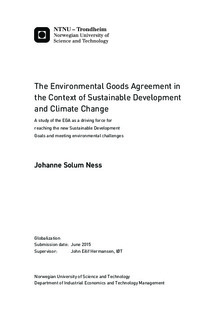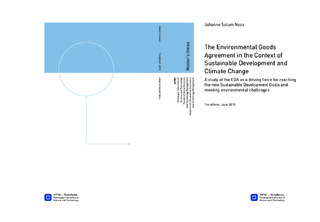| dc.description.abstract | 2015 is the year of great decisions and efforts. Meetings on the UN post-2015 Sustainable Development Goals, the 21st Conference of the Parties (COP21) of the UN Framework Convention on Climate Change, and the 10th Ministerial Conference of the WTO will decide on the next steps in combating climate change and poverty. Influenced by the threats of climate change and environmental degradation, a small group of countries have come together to liberalize trade in environmental goods and services.
This paper provides a qualitative analysis of the environmental goods agreement (EGA) and related concepts of green economy, sustainable development goals, the IPCC and IPBES. Through analysis of semi-structured interviews and documents, the study identified nine themes concerning the research issue. These themes guided the analysis, and together with the theoretical framework of sustainability, green economy, international environmental agreements and credibility, some interesting results emerged on the relation between the EGA and international environmental agreements, SDGs, and the compatibility of the understanding of environmental goods in the EGA with needs and requests for green products and technology. According to the results, the EGA is compatible with international initiatives and the sustainable development goals (SDGs) to some degree, and has the potential to be a driving force for achieving positive impacts related to environmental and sustainability challenges. The understanding of EGs in the EGA is divided, and the initiative needs to incorporate environmental services and non-tariff barriers, as well as become more transparent, and create a strong connection and cooperation with other international initiatives such as the UNFCCC. | |

